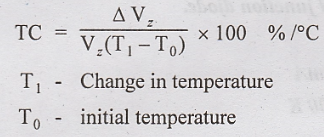Electronic Devices and Circuits: Unit I: Semiconductor Devices
Breakdown Mechanisms in Zener Diode
Zener breakdown, Avalanche breakdown
There are two types of mechanisms due to which breakdown occurs. They are i. Zener breakdown ii. Avalanche breakdown
BREAKDOWN MECHANISMS IN ZENER DIODE
There
are two types of mechanisms due to which breakdown occurs. They are
i.
Zener breakdown
ii.
Avalanche breakdown
Avalanche Breakdown
When
the reverse bias voltage is increased, the field across the junction also
increases. Thermally generated carriers crossing the junction acquire a large
amount of kinetic energy from this field.
The
velocity of these charge carriers increases and these electrons disrupt
covalent bond by colliding with immobile ions and create new electron-hole pairs.
These
new charge carriers again acquire sufficient energy from the field and collide
with other immobile ions and generate further electron-hole pairs. This process
continues and results in generation of avalanche of charge carriers within a
short time. This mechanism of carrier generation is called as Avalanche
multiplication.
This process results in flow of large amount of current at the reverse bias. Zener diodes having Zener Voltage above 6V exhibit avalanche breakdown and the diode has positive temperature coefficient i.e., the breakdown voltage increases when the p-n junction temperature is increased. Thus Zener diode has positive temperature coefficient.
Zener Breakdown
When
P and N regions are heavily doped, strong electric field is created which
results in direct rupture of covalent bonds. Hence new electron-hole pairs are
generated and the reverse current begins to increase.
This
process occurs at a reverse bias below 6V. Due to heavy doping, the depletion
width becomes very small and the electric field across the depletion region
becomes very high of the order of 107 V/m. Thus Zener breakdown
occurs.
For
lightly doped diodes, the breakdown voltage is high and it is mainly due to
Avalanche multiplication. Thus in Zener diode, breakdown occurs both in lower
and higher breakdown voltages ie both Avalanche and Zener breakdown occurs.
Such diodes are called Zener diodes.
Tepemrature Coefficient of Zener Diode
The
percentage change in the Zener voltage V, for every °C rise/fall in temperature
is called Temperature Coefficient (TC) of a Zener diode.

If
Vz is less than 6 V, the
temperature coefficient is negative. For Zener diode with Vz greater
than 6 V, the temperature coefficient is positive.
Electronic Devices and Circuits: Unit I: Semiconductor Devices : Tag: : Zener breakdown, Avalanche breakdown - Breakdown Mechanisms in Zener Diode
Related Topics
Related Subjects
Electronic Devices and Circuits
EC3353 - EDC - 3rd Semester - ECE Dept - 2021 Regulation | 3rd Semester ECE Dept 2021 Regulation
